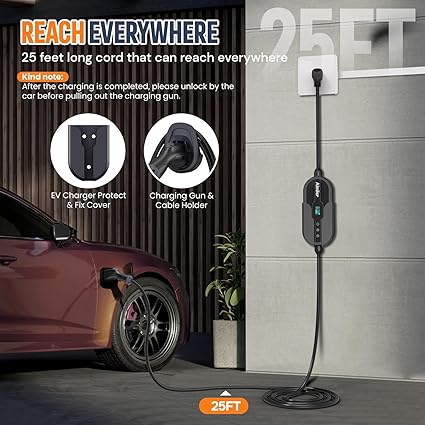Electric Vehicles (EVs): Growing Interest in Sustainable Transportation with Tesla and New Brands
In recent years, electric vehicles (EVs) have become a hot topic in the world of transportation. With increasing concerns about climate change, pollution, and the depletion of fossil fuels, many people are turning to more sustainable options. Electric vehicles offer a cleaner, greener way to travel, and companies like Tesla are leading the charge. In this blog post, we will explore the rise of electric vehicles, their benefits, and how new brands are entering the market to meet the growing demand for sustainable transportation.
Level 2 Electric Vehicle (EV) Charger Buy With Amazon
What Are Electric Vehicles (EVs)?
Electric vehicles are cars that run on electricity instead of gasoline or diesel. They use electric motors powered by batteries to drive. There are different types of electric vehicles, including:
Battery Electric Vehicles (BEVs): These vehicles are fully electric and rely solely on batteries for power. They have no gasoline engine and produce zero tailpipe emissions.
Plug-in Hybrid Electric Vehicles (PHEVs): These vehicles have both an electric motor and a gasoline engine. They can run on electricity for a certain distance before switching to gasoline.
Hybrid Electric Vehicles (HEVs): These vehicles combine a gasoline engine with an electric motor but cannot be plugged in to charge. They use regenerative braking to recharge the battery while driving.
How Do Electric Vehicles Work?
Electric vehicles operate using a few key components:
Electric Motor: This is the heart of the vehicle, converting electrical energy from the batteries into mechanical energy to drive the wheels.
Battery Pack: The battery stores energy and powers the electric motor. Most EVs use lithium-ion batteries, which are lightweight and have a high energy density.
Charging System: Electric vehicles can be charged at home or at public charging stations. Charging can take anywhere from a few hours to overnight, depending on the charger and the vehicle’s battery size.
Regenerative Braking: This technology allows the vehicle to recover energy while slowing down. It converts kinetic energy back into electrical energy, which is then stored in the battery.
The Rise of Electric Vehicles

The interest in electric vehicles has grown significantly over the past decade. Several factors have contributed to this trend:
1. Environmental Concerns
As awareness of climate change and air pollution increases, many people are looking for ways to reduce their carbon footprint. Traditional gasoline-powered vehicles emit greenhouse gases, contributing to global warming. In contrast, electric vehicles produce no tailpipe emissions, making them a cleaner alternative.
2. Advancements in Technology
Improvements in battery technology have made electric vehicles more efficient and practical. Modern EVs can travel longer distances on a single charge, making them more appealing to consumers. Additionally, the cost of batteries has decreased, leading to lower prices for electric vehicles.
3. Government Incentives
Many governments around the world are offering incentives to encourage the adoption of electric vehicles. These incentives may include tax credits, rebates, and grants for purchasing EVs, as well as funding for charging infrastructure. Such policies make it more affordable for consumers to switch to electric.
4. Growing Charging Infrastructure
The expansion of charging stations has made it easier for EV owners to recharge their vehicles. Many cities are installing public charging stations, and some companies are developing fast-charging networks that allow drivers to charge their vehicles quickly while on the go.
5. Changing Consumer Preferences
Younger generations are increasingly prioritizing sustainability and environmental responsibility. As a result, many consumers are more willing to consider electric vehicles as a viable option for their transportation needs.
Tesla: The Pioneer of Electric Vehicles

One of the most well-known names in the electric vehicle market is Tesla. Founded in 2003 by Elon Musk and a group of engineers, Tesla has played a significant role in popularizing electric vehicles. Here are some reasons why Tesla stands out:
1. Innovative Technology
Tesla is known for its cutting-edge technology, including advanced battery systems, autopilot features, and over-the-air software updates. These innovations have set Tesla apart from traditional automakers and have made their vehicles highly desirable.
2. Long Range and Performance
Tesla vehicles are known for their impressive range and performance. Models like the Tesla Model S can travel over 370 miles on a single charge, making them suitable for long-distance travel. Additionally, Tesla cars are known for their quick acceleration and sporty handling.
3. Supercharger Network
Tesla has developed its own network of fast-charging stations called Superchargers. These stations allow Tesla owners to charge their vehicles quickly, making long road trips more feasible. The widespread availability of Superchargers has helped alleviate range anxiety for many drivers.
4. Sustainability Commitment
Tesla is committed to sustainability not only through its electric vehicles but also in its manufacturing processes. The company aims to produce its cars using renewable energy sources and is working on recycling initiatives for its batteries.
5. Strong Brand Loyalty
Tesla has built a loyal customer base, with many owners passionate about the brand and its mission. This loyalty has contributed to the company’s success and has helped it become a leader in the electric vehicle market.
New Entrants in the Electric Vehicle Market
While Tesla has been a dominant player in the electric vehicle space, many new brands are emerging to meet the growing demand for sustainable transportation. Here are a few noteworthy newcomers:
1. Rivian
Rivian is an American electric vehicle manufacturer focused on producing electric trucks and SUVs. Their R1T pickup truck and R1S SUV have garnered significant attention for their rugged design and impressive performance. Rivian has also committed to sustainability by incorporating eco-friendly materials into its vehicles.
2. Lucid Motors
Lucid Motors is known for its luxury electric sedan, the Lucid Air. This vehicle boasts an impressive range of over 500 miles and features a high-end interior with advanced technology. Lucid Motors aims to compete with Tesla in the luxury EV market, offering a premium experience for consumers.
3. Ford
Ford has entered the electric vehicle market with its Mustang Mach-E, an all-electric SUV that combines performance with practicality. The company is also developing the all-electric Ford F-150 Lightning, which aims to bring electric power to its popular truck lineup. Ford’s commitment to electric vehicles demonstrates that traditional automakers are adapting to the changing landscape.
4. Volkswagen
Volkswagen has launched its ID.4 electric SUV as part of its strategy to become a leader in the electric vehicle market. The ID.4 offers a spacious interior, advanced technology, and a competitive range. Volkswagen’s investment in electric vehicles shows its commitment to sustainability and innovation.
5. Nissan
Nissan has been a pioneer in the electric vehicle market with its Leaf model, one of the best-selling electric cars worldwide. The company continues to innovate with new models and technologies, including the upcoming Nissan Ariya, an all-electric SUV that promises to deliver a stylish design and advanced features.
Benefits of Electric Vehicles

Electric vehicles offer numerous benefits for both individuals and the environment. Here are some of the key advantages:
1. Environmental Impact
As mentioned earlier, electric vehicles produce zero tailpipe emissions, which helps reduce air pollution and combat climate change. By choosing an EV, you contribute to cleaner air and a healthier planet.
2. Lower Operating Costs
Electric vehicles are generally cheaper to operate than gasoline-powered cars. Electricity is often less expensive than gasoline, and EVs require less maintenance since they have fewer moving parts. This can lead to significant savings over time.
3. Quiet Operation
Electric vehicles are much quieter than traditional vehicles, resulting in reduced noise pollution. This can create a more pleasant driving experience for both the driver and those around them.
4. Incentives and Tax Benefits
Many governments offer incentives for purchasing electric vehicles, making them more affordable. These incentives can include tax credits, rebates, and access to carpool lanes, further enhancing the appeal of EVs.
5. Energy Independence
By using electricity as a fuel source, electric vehicles can help reduce dependence on fossil fuels. This shift not only benefits the environment but also promotes energy independence for countries that rely heavily on oil imports.
Challenges Facing Electric Vehicles

Despite the many benefits, electric vehicles also face some challenges that need to be addressed:
1. Charging Infrastructure
While the charging infrastructure is expanding, it is still not as widespread as gas stations. Some areas may have limited access to charging stations, making it inconvenient for EV owners.
2. Range Anxiety
Although modern electric vehicles have improved range, some drivers still worry about running out of battery power before reaching a charging station. This concern can be a barrier for potential buyers.
3. Initial Cost
Electric vehicles can have a higher upfront cost compared to traditional cars, although this gap is closing as battery prices decrease. However, the initial investment can still be a concern for some consumers.
4. Battery Life and Recycling
The lifespan of EV batteries is a consideration for potential buyers. While most batteries last several years, they will eventually need to be replaced. Additionally, recycling old batteries poses environmental challenges that need to be addressed.
5. Consumer Awareness
Many consumers still lack awareness of the benefits of electric vehicles and how they work. Education and outreach are essential to help people understand the advantages of switching to an EV.
The Future of Electric Vehicles
The future of electric vehicles looks promising. As technology continues to advance, we can expect even more improvements in battery efficiency, charging speed, and vehicle performance. Here are some trends to watch:
1. Increased Adoption
As more consumers become aware of the benefits of electric vehicles, adoption rates are expected to rise. With government incentives and a growing charging infrastructure, more people will consider making the switch.
2. Diverse Options
The electric vehicle market will continue to expand, with more brands offering a wider range of models. From compact cars to SUVs and trucks, consumers will have more choices to suit their needs.
3. Advancements in Battery Technology
Research and development in battery technology will lead to longer-lasting batteries with faster charging times. Solid-state batteries, for example, hold promise for the future of electric vehicles.
4. Sustainable Manufacturing
As sustainability becomes a priority for consumers, manufacturers will focus on eco-friendly production methods. This includes using recycled materials and renewable energy sources in the manufacturing process.
5. Smart Features
Electric vehicles will likely incorporate more smart features, such as advanced driver-assistance systems, connectivity, and autonomous driving capabilities. These innovations will enhance the driving experience and improve safety.
Conclusion
Electric vehicles are at the forefront of the movement towards sustainable transportation. With growing interest from consumers, advancements in technology, and the emergence of new brands, the future of electric vehicles looks bright. Companies like Tesla have paved the way, but many new players are entering the market, offering exciting options for consumers.
As more people recognize the benefits of electric vehicles, such as reduced environmental impact, lower operating costs, and innovative technology, we can expect to see a significant shift in the automotive landscape. The transition to electric vehicles is not just a trend; it is a necessary step towards a more sustainable and eco-friendly future. By embracing electric vehicles, we can contribute to a cleaner planet and a healthier lifestyle for ourselves and future generations.

